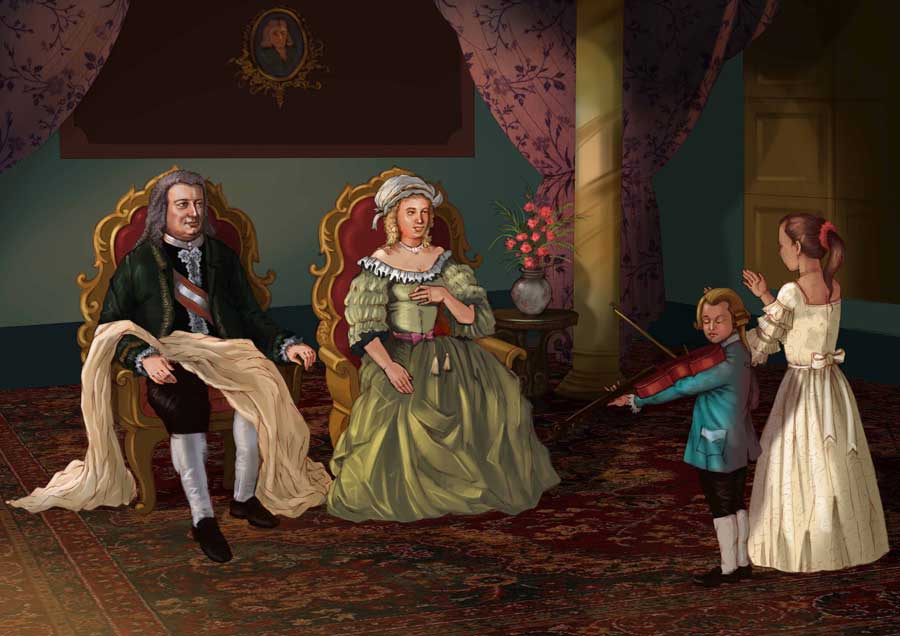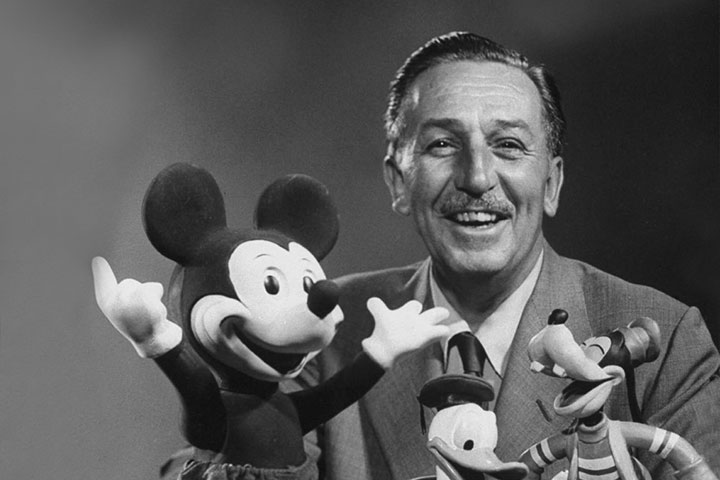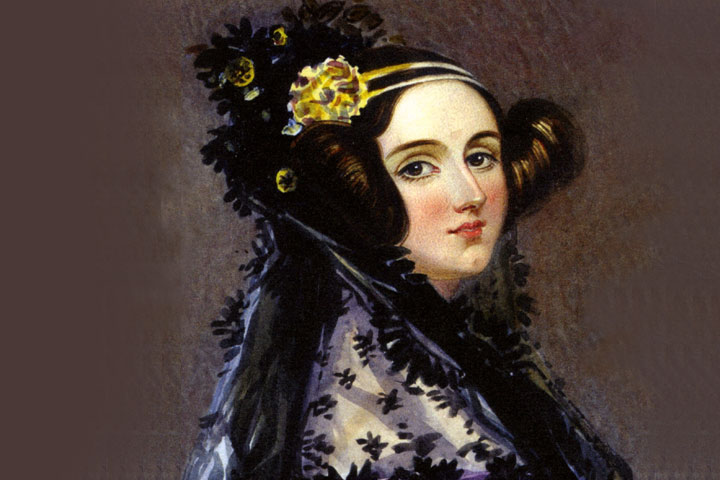
A bowl of sun kissed oranges… A scented garden on a moonlit night… A nightingale chirping an alluring tune… A shimmering, rippling brook… Stars softly twinkling in the night sky…
Just imagine how the world would be indeed without such beauty to please the eye and calm the soul. Nature’s allure takes various forms, one of which is music. Across the emerald forests and aquamarine waters, the language of music remains the same, irrespective of caste, creed and nationality. Music possesses an irresistible power to stir hearts and invoke an immediate reaction. Almost every one of us has a favourite tune which we never tire of and which always manages to make us feel good. Such potency; it’s almost like a weapon; blessed are the men and women who know how to create it.
Over the aeons, the world has seen countless composers; their music has brought forth delightful smiles and laughter, sweet pain and also soothing calm. One of the greatest composers is a man called Wolfgang Amadeus Mozart. The love affair of Mozart and Music has given the world, something to suit every mood; delicate, light fairy like compositions; serene, restful harmonies and stormy, strong, powerful music. Einstein once said that while Beethoven created his music, Mozart’s “was so pure that it seemed to have been ever-present in the universe, waiting to be discovered by the master.” What was the secret behind such effortless mastery? How do his compositions seem ever fresh? Let’s begin on a musical journey and peep into the life of a maestro whose tunes refuse to be blotted from our minds even after 200 years.

It was the winter of 1756. A family in the town of Salzburg, Austria was celebrating the arrival of their seventh child into the world. The baby boy was christened Joaness Chrysostomus Wolfgangus Theophilus Mozart. The first part of his name was in honor of St. John Chrysostom, as the baby’s birthday, 27 January, was the ‘feast day’ of Saint John. Wolfgang was the name of his maternal grandfather. The name Theophilus (Greek word for ‘loved by God’) was in honor of Mozart’s godfather Joannes Theophilus Pergmayr. As a child, he was called by the name Wolfgang or the nickname Wolfgangerl. In later years, he often added Theophilus but translated it into Amade (French), Gottlieb (German) or Amadeus (Latin). Today the world knows him best as Wolfgang Amadeus Mozart.
Wolfgang was the sole surviving son of Leopold Mozart and his wife Anna Maria. Only two of the couple’s children survived past infancy – Wolfgang and his sister Maria Anna Walburga Ignatia (nicknamed Nannerl) who was five years elder to him. There existed a close bond between the brother and sister. Nannerl was Wolfgang’s confidante and his carissima sorrella or dearest sister.
Wolfgang’s father, Leopold, was a talented violinist and composer who regularly performed in churches and noble courts. He was also a music teacher and his book on the fundamental principles of violin playing ‘Versuch einer grundlichen Violinschule’ (A Treatise on the Fundamental Principles of Violin Playing), was one of the best books of its time for violin training and is still used today. Leopold worked as a violinist in the court orchestra of The Prince Archbishop of Salzburg, a position which he held for 44 years under five successive Prince Archbishops. He started as a fourth violinist and gradually worked up to the position of Deputy Kappellmeister in 1763 under Count Sigismund Christoph Schrattenbach. Wolfgang’s mother, Anna Maria, was a gentle and kind woman with a strong sense of duty.
Archbishop – A bishop is an ordained or consecrated member of the Christian clergy who is generally entrusted with a position of authority and oversight. An Archbishop is a bishop of higher rank.
Kappellmeister – a German word referring to a person in charge of music making. The word is a compound of Kappelle which means choir, orchestra or chapel and Meister which denotes master.
The Mozart’s were a very close knit family. They were neither very wealthy nor too poor. Their apartment where Wolfgang was born was conveniently central and had enough space to practice music. The Mozart home was frequently visited by friends and acquaintances and was one of the centres of domestic musical life in Salzburg.

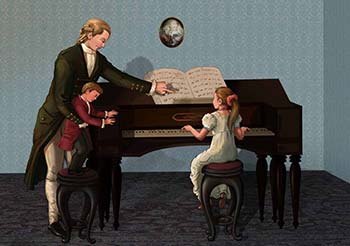
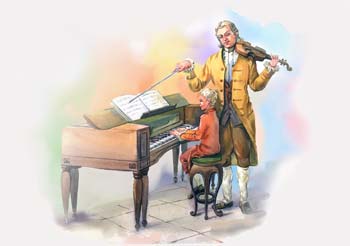
Wolfgang’s was not an ordinary childhood. The boy never went to school and was instead coached by his father at home. The young boy was very good at Mathematics and he would scribble mathematical figures all over the walls and tablecloths; he could also speak in seven different languages! The musician Leopold introduced his children to music at a very early age. Nannerl’s musical education began at seven on the Clavier (keyboard). Little Wolfgang would look on eagerly while his sister played. The keyboard soon became the baby’s most loved toy and he would spend hours picking out tunes on it. Noting his son’s interest, Leopold began teaching him music since the age of four.
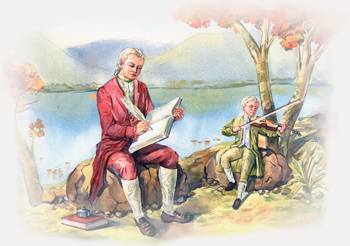
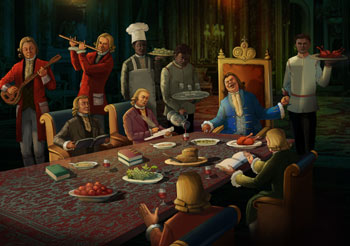
Leoplod began by teaching the young Wolfgang Minuets (a type of slow music). Not only did the child pick it up very quickly but he also managed to play it effortlessly and with great sensitivity. The young musician could not have enough music and very soon he even learnt to play the violin. By the time he was five, Wolfgang was composing short pieces which he would play to his father who would write them down. Leopold taught his children well; he made the lessons fun and interesting but at the same time demanded utmost concentration and perfection. As their music teacher, he knew that his children were exceptionally talented and could easily become a bankable asset for him. To this end, he risked his children’s health and perhaps their childhood as well. But one should not judge him too harshly; he was only human and after all, he sacrificed his own career for the sake of his children. Also, Leopold still dreamt of making a name for himself, if not as a composer than as a writer. In those days, writers were generally more respected than musicians. Musicians were at par with the cooks, butlers and maids; just another type of servant hired to serve the rich. So, right from the early days, Leopold maintained a detailed record of everything concerning Wolfgang, mostly through diary-like letters which he sent to his friends when away from Salzburg. Perhaps he aimed to have them made into a biography later.

When Wolfgang was six, his father’s employer Count Schrattenbach, granted Leopold leave to take his children on a grand tour of European courts. Their first court performance was for Maximilian III Joseph, the Elector of Bavaria, in Munich, January 1762. Between September 1762 and January 1763, the brother-sister duo performed in Austria. At the young age of six, the little Wolfgang had the honor of performing before Emperor Francis I and Empress Maria Theresa. When the little boy slipped on the polished floor of the court, a small girl helped him back on his feet. This girl was Marie Antoinette who would later become the Queen of France!
How many parents can boast of children who have performed before royalty at such a tender age? The children’s parents were justifiably proud and Leopold wrote of this momentous occasion, “Their Majesties received us with such extraordinary graciousness that, when I shall tell of it, people will declare that I have made it up. Suffice it to say that Wolferl jumped up on the Empress’ lap, put his arms around her neck and kissed her heartily.”

After a brief rest, the whirlwind trip began again in June 1763 and lasted for three and a half years. Stops were made in Munich, Bonn, Cologne, Brussels, Paris, Versailles, London, The Hague, Geneva and Zurich.
The Mozart’s spent the Christmas of 1763 at the French court of Queen Maria Leszczynska and Louis XV (a Bourbon monarch) who ruled as King of France and Navarre. On New Year’s day, the Mozart family was invited to court dinner with the royal couple. Leopold narrated, “My Wolfgang was graciously privileged to stand beside the Queen the whole time, to talk constantly to her, entertain her and kiss her hands repeatedly, besides partaking of the dishes which she handed him from the table… I stood beside him, and on the other side of the King… stood my wife and daughter.”
The proud father invited many observers to test the talents of the wünderchild. Daines Barrington, a prominent English lawyer, antiquary and naturalist conducted one such test when Wolfgang was eight. The young lad was given a manuscript composed with five part open score of a new opera by a London composer. To add to the problem, two of the five lines were in the offbeat Italian style Contralto Clef which Wolfgang had never seen before. Did the young Mozart pass the test? He certainly did; not only did he play the piece flawlessly, but he also captured the composer’s tempos, dynamics and musical intentions. The British lawyer was stupefied by Wolfgang’s talent and described him as an “eight year old who stood seven feet tall.”
Clef- A clef or key is a musical symbol used to indicate the pitch of written notes.Contralto-The part sung by the highest male or lowest female voices.
While he was enthralling the royalty with his beautiful performances, the child musician was also composing endlessly. Between 1763 and1765, Wolfgang composed two Sonatas in Paris, seven Sonatas, two Symphonies, two Arias, a Motet and many untitled pieces in London and an Aria as well as a Symphony while in The Hague. Young Wolfgang was certainly a gifted child! Also, during this time, he met a great number of musicians and got acquainted with the work of other composers. In 1764-65, he visited Johann Christian Bach (a composer of the Classical era) in London, who particularly had an important influence on him.
Sonata – A composition for one or more solo instruments, one of which is usually a keyboard.Symphony – A long piece of music for an orchestra composing of many different instruments.
Aria – An extensive and complex song for solo voice.
Motet- A polyphonic choral composition with sacred lyrics; sung as a part of church service.
But life was not all thrill and magic for the young musician and his family. Travelling in those days had to be done by horse and coach, which was painfully slow and left one to the mercies of the weather. It was bitterly cold in winter, scorching hot in summer and nothing to say of the rains. Also, the family finances were never secure. If the Mozart’s were to be invited as house guests to wealthy houses, they had to make contact with the rich and pander to their whims and fancies, one of which was their habit of gifting silver snuff boxes instead of cash. Leopold felt this deeply and wrote: “We have swords, laces, mantillas, snuff boxes, gold cases, sufficient to furnish a shop; but as for money, it is a scarce article, and I am positively poor.” Also, this wandering circus life did not agree with the children and they frequently fell ill – strep throat, rheumatoid arthritis and typhoid fever, Wolfgang had them all.

Wolfgang was eleven when the family returned to Salzburg. The young boy now appeared as a composer and child prodigy. Here, he composed the Latin opera ‘Appollo et Hyacinthus’, widely believed to be his first real opera. He also composed a set of funeral music known as Grabmusik. But Leopold’s wanderlust soon made the family set off on yet another trip; within nine months the family was on its way to Vienna where they hoped to present Wolfgang’s first Italian opera buffa ‘La finta semplice’ (The Pretended Simpleton). But a smallpox epidemic forced them to flee to Moravia (now in Czech Republic) and then to Olmutz (or Olomouc in Czech Republic) where the children succumbed to the disease. Once the children recuperated, the family returned to Vienna, but the opera could not be presented as rumours had started doing the rounds that a mere child could not have composed music for an entire opera. Furious, Leopold herded the family back to Salzburg where the opera was performed only once in 1769. By this time, the 13 year old genius had already composed the first 65 pieces in the Kochel catalogue.
Opera buffa – An Italian comic opera of the 18th century.
Kochel catalogue - The Kochel-Verzeichnis is a complete, chronological catalogue of compositions by Mozart; it is abbreviated K or KV. Since created by Ludwig von Kochel, the list has been revised many times incorporating many corrections. Mozart’s last composition, the Requiem is K.626.
Observing his son’s spectacular progress, the stage parent Leopold decided to take his son to Italy, the land of music. In December 1769, the duo set off, leaving Nannerl and her mother behind in Salzburg. Nannerl’s professional music career seemed to have come to an end. The girl was reaching marriageable age and during those days it was considered improper for young girls to show off their artistic talent in public.

Father and son reached Rome in time for Easter and it was here that Wolfgang performed one of his most remarkable feats. The Sistine chapel in the Papal enclave of the Vatican was considered the centre of vocal music. They covetously guarded the renowned Italian composer Gregorio Allegri’s famous setting for the ‘Miserere’ which was a setting of Psalm 51. This was not allowed to be copied and its performance was banned anywhere else in the world except within the Sistine chapel. Wolfgang heard it while attending service one Wednesday and wrote it down later that day, entirely from memory. On a second hearing on a Good Friday, with the manuscript hidden under his hat, Wolfgang made some minor corrections to it.
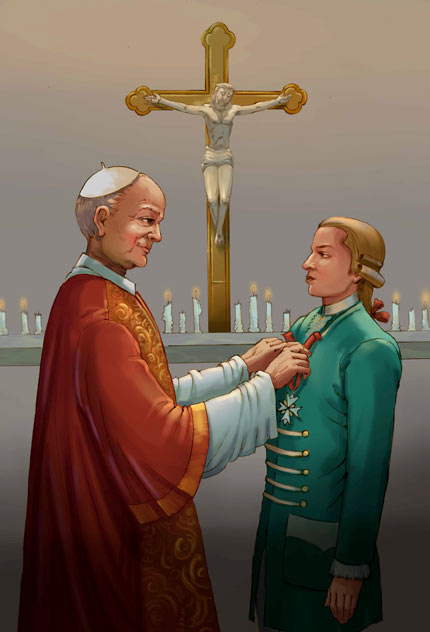
Wolfgang gave this manuscript to Dr. Charles Burney, an English music historian who was also in Rome at that time. The doctor went ahead and published the piece. When this news reached the Pope, he summoned Wolfgang. With great trepidation, the young musician complied. But Wolfgang need not have feared. The Pope showered praises on him and instead of excommunicating him, lifted the ban on the ‘Miserere’. Also, Wolfgang was conferred with the Order of the Golden Spur, which is a kind of knighthood conferred on people who have contributed to the glory of the church.
During this time, Wolfgang wrote his first major opera, Mitridate re di Ponto or Mithridates, King of Pontus which was performed in Milan. At this time, Mozart’s own voice was breaking. This annoyed him and Leopold reported to Salzburg that Wolfgang could no longer sing the music that he was composing; a composition which was an ‘opera seria’ and consisted almost entirely of Recitatives and Arias.
Opera seria- A type of opera performed in 18th century Italy based on a serious plot.
Recitatives- A vocal passage of narrative text in a musical composition.
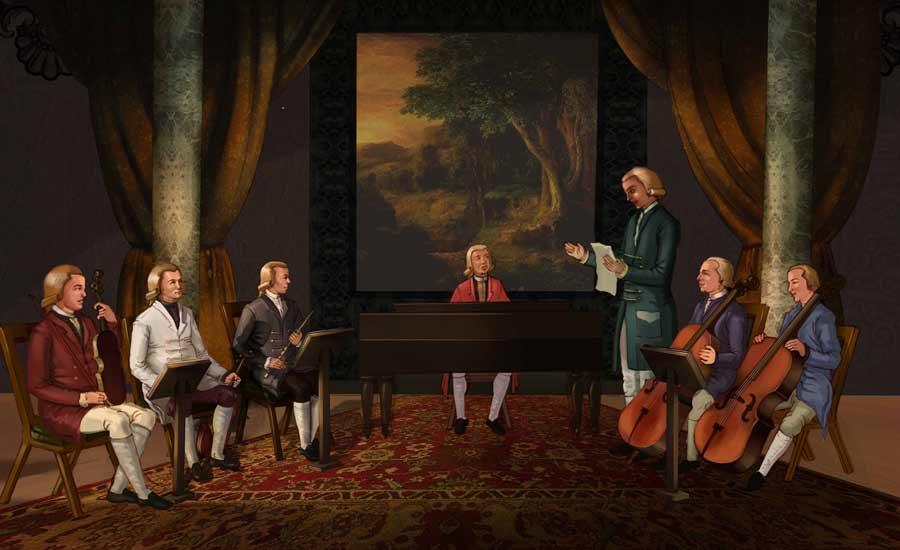
Wolfgang had to work closely with the singers to do justice to the opera. The work on the recitatives was exhausting and Mozart complained to his mother that it made his fingers ache. The opera was performed during the Christmas of 1771 and lasted for about six hours. Though it was never revived in Mozart’s lifetime, people liked the opera and it helped him to obtain two more commissions from Milan, the Serenata Ascanio (a pastoral opera in two parts ) in Alba and the opera seria Lucio Silla.
The Serenata Ascanio in Alba was prepared for the marriage of Archduke Ferdinand, one of the sons of Empress Maria Theresia; more aching fingers followed but it was well worth the effort. Mozart’s Serenata completely overshadowed the popular German composer Hasse’s opera series which was also commissioned for the wedding. Leopold joyously reported to Salzburg: “It really upsets me a lot, but Wolfgang’s serenata has killed the Hasse’s opera.” Ferdinand was impressed by Wolfgang’s performance and he asked his mother whether he might take the young composer into his employment. But the Empress told him not to “burden himself with useless people… who go about like beggars… besides he has a large family.”
Cantata- A musical composition for voices and orchestra based on a religious text.
Serenata- An 18th century dramatic cantata.
Flush with the success of Ascanio, the father-son duo returned to Salzburg only to be struck by a grievous blow. The ever obliging Archbishop Schrattenbach had died and a new Prince Archbishop Hieronymus Colloredo was appointed in March 1772. This appointment was to be the source of much annoyance and vexation to the Mozart’s in the years to come. Wolfgang soon became busy composing sacred music, Symphonies, dances and Divertimenti. In October, the duo set off for Milan for the opera seria ‘Lucio Silla’ which proved to be even more successful than Mitridate with 26 performances!
Divertimenti- A piece of entertaining music.

Wolfgang and his father returned to Salzburg from their last trip to Italy in March 1773. The new Archbishop soon appointed Wolfgang as an assistant concert master with a small salary. During this time, the young maestro added greatly to his repertoire of sacred music. However, both, Wolfgang and Leopold were unhappy working for the new Archbishop. Colloredo believed in disciplined worship without too much ceremony which meant that the music part of the service was severely cut short. Also, he was against his employees going off to foreign parts, where they made good money and yet they had to be paid as if they were in Salzburg.
Wolfgang also longed to compose operas and Salzburg provided only rare occasions for these. In 1775, the situation worsened when the court theatre was closed. The young composer felt stifled; if only he could break free! His father thought on the same lines that Wolfgang must find a job outside Salzburg. With this in view, in August of 1777, Leopold sought permission from Colloredo for another leave which was promptly rejected. The Archbishop rightly divined that the leave would amount to a job hunting trip and he gave both father and son, the sack. After much wheedling, he agreed to relieve Wolfgang from his services and retain Leopold but only if the latter stayed back in Salzburg.

Leopold decided that his wife must accompany their son on this trip. Accordingly, in September of that year, Wolfgang set off on his first journey without Leopold. The young composer was wildly excited; the feeling of being free was exhilarating. Though his mother accompanied him, she was not demanding like her husband. Leopold made the preparations and planned out a route which the mother-son duo was supposed to follow .This route would bring them in contact with friends along the way who may prove to be very helpful. Though Leopold was not going with Wolfgang, his entire heart was on the trip and he meant to closely monitor the entire journey trip from home. Wolfgang had strict instructions from his father: either find a good job or make money.
Their first stop was in Munich. Young Wolfgang followed Leopold’s strategy which was to introduce oneself to people in high places, give a concert in the hope of receiving commissions and teach and compose for the local populace. But the strategy did not pay off as Munich declined politely. The duo then moved on to Augsburg, where Wolfgang spent much of his time with his cousin Maria Anna Thekla Mozart ( nicknamed Basle). Some believe that the cousins were romantically involved, perhaps because of the amorous letters which Wolfgang wrote to Basle about moving away from Augsburg. As far as his music was concerned, Wolfgang gave just one concert here but there was no court in Augsburg to employ him. By the end of October, mother and son were in Mannheim. This stop proved to be crucial in many ways and it sowed the seeds of friction between Wolfgang and his father.


Mannheim transformed Wolfgang’s life in many ways. For the first time in his adult life, he was working in such a musically charged atmosphere. Leopold himself called Mannheim “that famous court, whose rays are like the sun’s, lighting up the whole of Germany.” But he lambasted Wolfgang for stopping at Mannheim without consulting him first, instead of directly heading for Paris. The shrewd Leopold knew that in a place brimming with talent like Mannheim, Wolfgang would be welcomed only as a visitor. The father son relationship was developing cracks; the closeness which they had always shared and which had reached its peak during their trips to Italy was starting to wither.
Leopold bombarded Wolfgang with letters which were always chock-a-block with advice bordering on orders; Wolfgang must keep to his diet, his mother must keep warm. No doubt all this was well meant, but it irritated Wolfgang who was now an adult with his own thoughts and opinions. Why couldn’t his father be less controlling? Also, Leopold wanted him to be as meticulous as himself: “Why can’t you write letters the way I do?” Leopold would chide him. “If I break off a letter and begin again the next day, I write down whether it’s Sunday or Monday.”
Not that Wolfgang’s letters were not detailed but they were written in a style completely unlike Leopold’s and were not suitable as publishing material. Following is an excerpt taken from one of Wolfgang’s letters to his father from Mannheim regarding a party with the Mannheim Kappelmeister Christian Cannabich:
“I, Johannes Chrisostomus Amadeus Wolfgangus Sigsimundus* Mozart, am guilty of not coming home until 12 o’clock midnight… from 10 o’clock until said hour at Canabich’s, I did some rhyming in the presence of said Canabich, his wife and daughter… nothing too serious, but rather light and frothy, actually nothing but crude stuff… I would not have behaved so godlessly if our ringleader, known as Lisel, namely Elisabetta Canabich, had not inspired and excited me to such high degree. I must also confess that I thoroughly enjoyed it all.”
*Sigismund was never one of Wolfgang’s names but was perhaps a tribute to the late Archbishop.
But it was not all play; Wolfgang worked very hard as well. The composer in him was very busy in Mannheim. He became interested in wind instruments and very soon became the most adroit composer for wind instruments of his time. He disliked the flute though and when he received a commission from a skilled amateur flute player for some music involving flute he did not finish the work and received only 96 gulden (florins) instead of the promised 200. It took many days for his father to forgive him for this sin.
Wolfgang was delighted with Mannheim. He knew that he would need to convince Leopold about his prospects in the town if he was to stay there for long. So, he would send weekly bulletins to his father writing about his successes in Mannheim.
“The Elector, the Electress and the entire court are well pleased with me. In the Academie, the two times I performed, both he and she came right up to me and stood next to me at the Clavier… I talked with the Elector as if he and I were the best of friends… The Elector himself asked again and again; he sat right next to me and sat perfectly still.”
It was in Mannheim that Wolfgang met the family of Fridolin Weber. The family was far from wealthy; Weber was an occasional singer, prompter and copyist in the theatre. Wolfgang was directed to Weber as he would be able to copy music for him. Weber had four daughters who were all talented musicians. The young Wolfgang might have hoped that he would appeal to them as he was not bad looking. Very soon, he fell in love with the second daughter Aloysia. Though his increasingly frustrated father directed him to find a steady job or else go someplace where money could be made, Wolfgang continued to stay in Mannheim, enjoying Aloysia’s company and composing music. In early 1778, the two of them concocted a plan to go to Italy to find Aloysia some singing engagements. Wolfgang boldly told his father of his plans.
Leopold was filled with rage as he knew he would lose control on his son once he got married; also he justly saw that the plan was nonsensical. He wrote a furious letter to his son: “I have read your letter of February 4 with amazement and horror… Your proposal to travel about with Herr Weber and, Nota Bene, 2 of his daughters has almost driven me to insanity… Off with you to Paris!” Leopold held the purse strings in the family and so, soon succeeded in packing off his son and wife to Paris.

Paris proved to be a failure right from the start. The main issue was, Paris was already habituated with musicians from various nationalities. So for them, Wolfgang was no one special but just one of the many brilliant composers that it was used to hearing. The young Wolfgang felt it sorely and wrote to his father “these stupid Frenchmen think I am just 7 years old… they treat me here like a beginner – except the musicians; they know better. But it’s the general public that counts.” Wolfgang got no commissions to write full length operas, only a short ballet ‘Les petit riens’ or A bit of nothing, which was one of his least momentous compositions. He tried his luck as a teacher and made some headway but the cost of travelling to his pupils’ homes sounded the death knell for this venture. The only success of his visit was the Symphony ‘Paris’ which he composed. A well-wisher of theirs told both father and son, that Wolfgang was too friendly and laid back to make a mark in Paris.
Meanwhile, Wolfgang and his mother were starting to run out of money and Wolfgang had to pawn several of his personal belongings to pay for their living and travelling expenses. To make matters worse, his mother fell ill in July 1778 with fever. There was some delay in procuring medical assistance either because of his mother’s insistence for a German doctor or their acute shortage of funds. Finally, a doctor came but he couldn’t save Wolfgang’s mother and she died on 3rd July. Wolfgang was devastated and all alone in an alien place with only himself for support. He wrote one of his gloomiest yet greatest piano Sonatas K.310 in ‘A minor’ as a result of his mother’s death.
Leopold who was likewise ravaged, urged his son to come back to Salzburg where he had wangled a job for him as a court organist. Wolfgang abhorred the idea of going back to Salzburg and delayed his return as long as he could. Perhaps needing some emotional support, he decided to go back to Mannheim to meet Aloysia. Wolfgang still clung to the hope of finding employment outside Salzburg. Leopold was incensed with his wayward son and wrote him a stinging letter: “I really don’t know what to say anymore. I will either lose my mind or die of exhaustion… Your whole intent is to ruin me so you can build your castles in the air… I hope that, after your mother had to die in Paris already, you will not also burden your conscience by expediting the death of your father.” Obdurate, Wolfgang still went to Mannheim but he had to leave empty handed as there was no job for him and no Aloysia either. She had moved to Munich. Wolfgang then went to Munich where he encountered a completely different Aloysia; she was successful and seemed to have no feelings or time for him. Defeated, he decided to return to his prison, Salzburg. He wrote to Leopold: “I’m looking forward to seeing you but not Salzburg… I cannot stand Salzburg and its inhabitants… I find their language – their manners quite insufferable.”

In February 1779, Wolfgang began his duties as a court organist in Salzburg where he was responsible for composing new works. No commissions seemed forthcoming so Wolfgang immersed himself with heart and soul into composing some of his most beautiful sacred and orchestral music to date. Despite this, once he left Salzburg for Vienna he insisted that he had found it very difficult to get down to serious work in Salzburg.
The seeds sown in Mannheim and Paris finally took root and in 1780, Wolfgang he was offered a commission for an opera the Idomeneo, re di Creta or Idomeneo, King of Crete in Munich. This is considered by many to be his greatest opera. The jubilant Wolfgang was soon in Munich, composing furiously. This was his first opera in five years and he put all his energy into it. One of the characters of the opera was the sea god, Neptune. The perfectionist that Wolfgang was, he fixed this speech four times, reducing the words in each setting, for he believed that the jolt of hearing a supernatural voice was quickly lost. As Wolfgang wrote to Leopold – “If the speech of the ghost in ‘Hamlet’ were not so long, it would be much more effective.”
Father and son again came close, if only professionally, as they exchanged letters over the opera. But some of the ache still lingered, though both tried hard to go back to the old easy footing. When Wolfgang was down with a cold, Leopold advised him on treatment and proposed to come and stay with him should his cold worsen. However, he could not stop himself from adding a spiteful little remark: “had I been with your mother, I would like to believe, she would still be alive”. Leopold came for the performance of the opera though, and also brought along Nannerl. The audience liked the opera but it was performed only three times in Munich.
Wolfgang was still in Munich savouring the success of his opera and wondering if he could dare to hope for more commissions, when he was summoned by Archbishop Colloredo to Vienna, where the latter had gone to visit his own father. Accordingly, Wolfgang set off for Vienna, while Leopold went back to Salzburg. Little did the two realize how significant this parting would turn out to be.

The young composer set off for Vienna with high hopes. He felt sure that he could make a career for himself in the land of the Clavier. But how could he forge useful contacts when he was supposed to hang around in the corners waiting for the Archbishop’s summons? Also, who knew when he would be packed off to Salzburg? He was not about to let go of such a golden opportunity, not Wolfgang Amadeus Mozart. Accordingly, he went ahead and started making contacts with potential patrons, musicians and theatre folk. When the Archbishop came to know of his servant’s activities, he was enraged and he accused Wolfgang of being a scoundrel, a lousy rogue, a cretin. However, it must be noted that the source for this entire fracas is Wolfgang’s letters to his father and so the information is essentially one sided.
The seemingly naive Wolfgang felt sure that this was the sack and he wrote to his father that he had answered back. However, he was told that a spoken word has no legal standing so for all practical purposes, he was still an employee of Archbishop Colloredo. Also, how could he resign – he was a servant, wasn’t he? The only option open to him was to apply in writing to be dismissed from his position and this would have to be backed by his father’s permission though he was now 25 years old!
Finally and as per Wolfgang, literally, he got the order of boot from Count Arco, the Archbishop’s personnel manager. Earlier, Count Arco like Leopold had tried to persuade Wolfgang to be more reasonable but this only succeeded in inciting the young man further and he wrote: “by refusing to accept a petition… but not informing your master because you lack the courage to do so and because you love being a pedantic bureaucrat, you keep a fellow dangling for four weeks and, finally as this fellow is forced to hand in his petition himself, you throw him out the door and give him a kick on his Behind – And that’s the Court who, according to your last letter, has only my interest at heart…”
Wolfgang, carried away by his youth, badly wanted to execute a return kick but this was foolhardy as attacking a person of higher rank could lead to imprisonment or a whipping. As expected, Leopold wanted him to come back to Salzburg but Wolfgang was in two minds about it. His father had some cause for worry as nasty rumours had reached Salzburg about the company which his son was keeping and his supposed drinking habits. Wolfgang went to great pains to deny all this and wrote: “You need not worry about the salvation of my soul.” Perhaps there was some truth to these rumours but his productivity proved that whatever else Wolfgang was doing, he was working very hard. In the end, much to his father’s chagrin, Wolfgang decided to stay on in Vienna as a freelance performer and composer.

Even before his summary dismissal by the Archbishop, Wolfgang had moved to private lodgings. This irked Leopold still further as the household was that of the Weber family. Fridolin had died and his widow and three unmarried daughters Josepha, Constanze and Sophie had settled down in Vienna. His old beloved Aloysia had married Joseph Lange, an actor and painter and was now a leading court singer. Gossip soon linked Wolfgang’s name with Constanze’s and he had to leave their house and move to other lodgings. He tried to make light of the whole Constanze angle to his father and said that gossips often linked him with his accomplished pupil Josepha Auernhammer, but there was no cause for worry: “She is heavy like a peasant wench, sweats to make you sick… People are wondering why I would take someone with a face like hers.”
However, his father was not fooled and in December 1781, Wolfgang came clean and admitted that he was committed to marry Constanze Weber. The Weber family wanted the two to get married quickly and when Wolfgang came to know that Constanze’s mother and guardian planned to compromise the couple so as to force them to marry, he refused to be a party to it. He did not find her beautiful though and maintained: “She is not ugly, but her whole beauty consists of two little black eyes and a graceful figure. She has no great wit but enough common sense to fulfil her duties as a wife and mother”. But he subtly praised her in his letters to Leopold trying to convince him to the match but Leopold was in no mood to listen.
In the midst of all this personal drama, the talented composer’s professional life was starting to look up. The second half of 1781 found him busy composing for the opera ‘Die Entfuhrung aus dem Serail’ or ‘The Abduction from the Harem’. The opera was actually scheduled for September 1781 but was finally performed in July next year. Wolfgang used this additional time to great effect; the genius that he was, he wrote music for the anxious beating of the hero’s heart as he waits to see his beloved. The opera was performed and it turned out to be a success and received a good number of performances. Once again Wolfgang hoped for follow-up commissions and yet again he was disappointed. The young composer had to find other ways to earn a living as he was getting married soon. He devoted himself to composing and created some very fine pieces.
Finally at the age of 26, Wolfgang married Constanze in Vienna’s St. Stephen’s Cathedral on 4th August, 1782. Leopold and Nannerl were against the marriage as they thought the Weber family to be socially inferior to them and hence never managed to develop a good rapport with Constanze. However, Leopold did consent to the wedding at the end and his letter agreeing to the marriage arrived just a day after the wedding. The couple had six children together, of which only two survived infancy.
Wolfgang was extremely happy and his way of showing happiness was by composing a huge ceremonial work. However, he never completed it as he realized that it held no appeal for the Viennese and had no saleable value either. Some of this music was performed during Wolfgang and Constanze’s only visit to Salzburg as a married couple in 1783. This was the last time that Nannerl saw her brother as she soon got married. The same year their first child, a son was born. They named him Reimund Leopold Mozart; sadly, he survived only for two weeks. Soon their second child, Karl Thomas, was born on 21st September, 1784 and was duly admired by Leopold when he came to visit them in the following year. He wrote to Nannerl that he was impressed by Wolfgang’s contacts, house and prestige.
In the same year, Wolfgang became part of the Freemasons. He faithfully attended the meetings and his work came to include a small category called Masonic music. The young composer’s thoughts on life and death were vastly affected by the teachings of the masons. The brotherhood was strong and many a times Wolfgang profited from the help of his brothers when in financial difficulties.
Freemasons are ordinary men in the community, of various religious backgrounds, who share a concern for human values, high moral standards, respect for the laws of society and the rights of others. Their practice of Freemasonry promotes self development, family, charitable and community service and socialisation with likeminded individuals and their families.
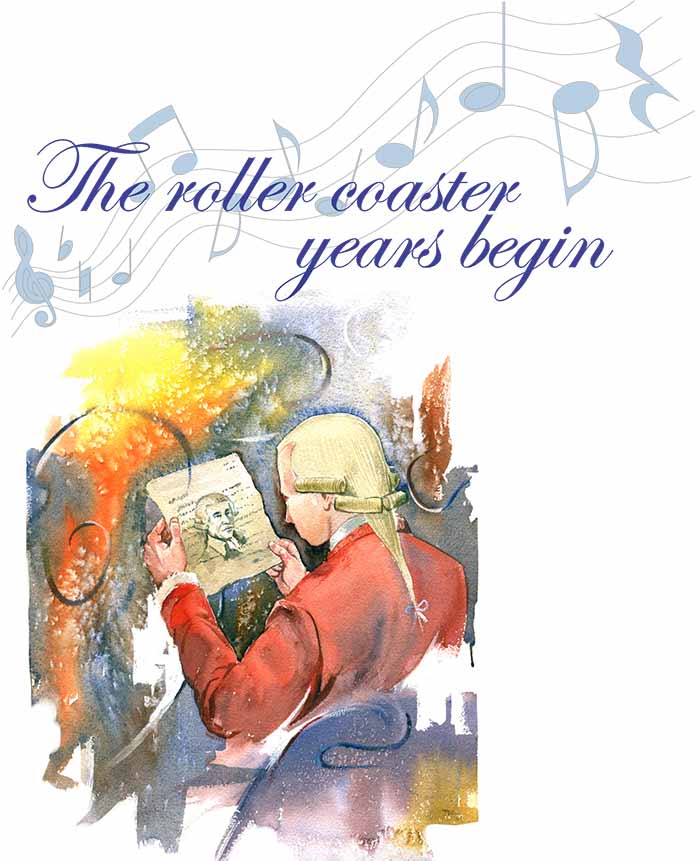
Wolfgang’s early years in Vienna were happy and busy ones. He was composing all kinds of instrumental music and was also studying the works of other composers, which at times influenced his own style. Joseph Haydn, one of the most famous composers of that period, reportedly told Leopold on one of his visits to Vienna, “As God is my witness and I an honest man, I say that your son is the greatest composer I know, in person or by reputation. He has taste and moreover the profoundest skill in composition.”
From 1782 to 1785, Wolfgang gave many self-produced concerts in which he was the ‘soloist’. Theatre space in Vienna was scarce and so he used to book unorthodox venues such as big rooms in residential buildings and ballrooms of expensive restaurants. The concerts were popular as Wolfgang enjoyed a special bond with his audience. The year 1784 was his most prolific year; during one five week period, he appeared in 22 concerts. At this time, he also began to keep a catalogue of his own music.


In 1786, Wolfgang made a re-entry in opera with Le nozze di Figaro or The Marriage of Figaro. This was his first opera with the librettist Lorenzo Da Ponte. The two wrote a total of three operas together – theirs was a partnership which gave the world perhaps the best operas in the range. Figaro was popular but it got only nine performances. The same year tragedy struck again when their third child, Johann Thomas Leopold Mozart was born, but he died after four weeks.
Early in 1787, Wolfgang went to Prague with this opera where it was a smashing success. Wolfgang was in the seventh heaven of delight and he wrote to a friend: “everyone was hopping about in sheer delight to the music of my ‘Figaro’, which had been transformed into Contredanses and German dances; for here they talk of nothing but – ‘Figaro’; nothing is played, blown, sung or whistled but – ‘Figaro’: no opera is seen as much as – ‘Figaro’; again and again it is ‘Figaro’; – it’s all a great honor for me.” For once, Wolfgang obtained another commission to write an opera, the ‘Don Giovanni’.
Librettist- Author of words for an opera.

By 1787, Wolfgang’s situation changed for the worse and the Mozart’s couldn’t keep up with the demands of their extravagant lifestyle. The large apartment was starting to pinch and in April, the family moved to a less expensive house. Wolfgang’s most lucrative business, teaching, had its own set of problems. Wolfgang had to travel to his pupils’ homes for giving lessons which severely strained his pocket. If he had to appear respectable he had to look equal in worth to those who paid him. That meant taking utmost care of his personal appearance which was not entirely unwelcome as he delighted in such things.
Good clothes were Wolfgang’s weakness. An excerpt from one of his letters shows his fondness for dress: “I simply must have such a jacket so it will be worth my effort to get those buttons, which I can’t get out of my mind… mother-of-pearl with several white stones around the edge and a beautiful yellow stone in the middle.” He was very proud of his fine hair and had them attended to every day; a barber would come each morning to curl, dress and powder it.
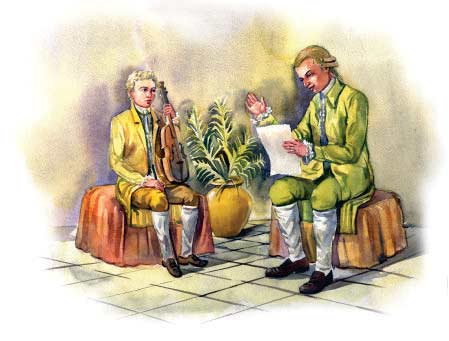
During this month, a 16-year old lad named Ludwig van Beethoven came to him for some lessons but had to leave after just two weeks as his mother fell ill. The two never met again. Soon, Wolfgang was sick with kidney problems. His childhood friend, Dr. Sigmund Barisani also died in this year and so did Wolfgang’s pet bird. Wolfgang and Constanze’s fourth child, Theresia Constanzia Adelheid Freiderika Maria Anna was born towards the end of the year but she too, died six months later. However, the biggest tragedy came in the form of Leopold’s death on 28th May, 1787. Leopold had been ill for some time but his death was sudden. Wolfgang did not get the chance to go to Salzburg to see his father one last time. Wolfgang’s last letter to his father was written on April 14.

No doubt, Leopold was glad to hear from his son but he soon died and Wolfgang never saw his father again. He felt the death of his father severely; they had been through so much together that it must have been very difficult for him to adjust to a life where there was no Leopold to write to, to listen to, even to get exasperated with! What Wolfgang needed now was a good steady job and that meant a court job. But this continued to remain elusive with the court’s preference for Italians and the influence of the Kappellmeister Antonio Salieri. Letters between father and son show, that both of them distrusted Italian musicians in general and Salieri in particular.

There was still Don Giovanni to look forward to and it turned out to be a success. But like always, there were no new commissions approaching. In December 1787, Emperor Joseph II appointed Wolfgang as his ‘chamber composer’ as the post had fallen vacant with the death of Gluck, the legendary opera composer. Though the gesture was meant to distinguish Wolfgang, the emperor had an ulterior motive as well. Joseph didn’t want him to leave Vienna. The pay was less and his responsibility was only to compose dances for the annual balls. Wolfgang supposedly said that the salary was “too much for what I do; too little for what I could do.” However even this modest income became important to him.
Situations worsened in 1788, when the emperor declared war on the Turkish Empire. The finances of the country suffered and the populace’s love for music took a back seat as people had increasingly less time and more importantly, less money for spending on music. People were still ready to shell out money for operas though, but unfortunately, Wolfgang didn’t have any operas on hand. Ironically, other musical activities (teaching and concert giving), which were his bread and butter, suffered grievously. The troubled composer’s financial situation grew dire and he was forced to pawn his valuables again. The next year, his fifth child daughter, Anna Maria Wolfgang was born in late November. She survived merely for an hour.
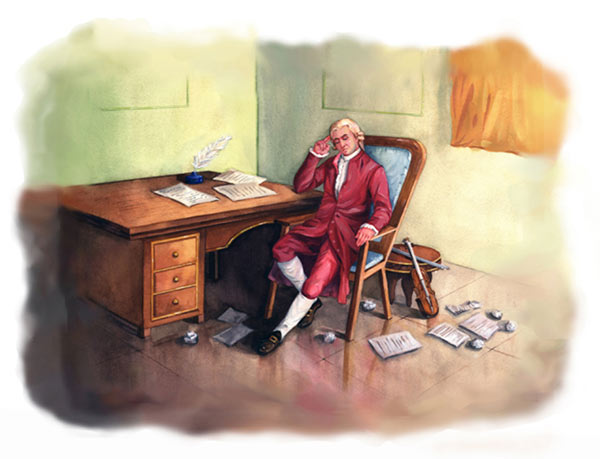
Wolfgang now threw himself into his work harder than ever but he could not compose much even though he regularly burned the midnight oil. He began to slip into depression and had frequent mood swings. Hoping to improve his fortunes, he made long journeys to Leipzig, Dresden and Berlin in the spring of 1789 and to Frankfurt, Mannheim and other German cities in 1790. However, these trips procured only isolated success and did not do much to relieve the family’s financial difficulties.
In 1790, Wolfgang finally got an opera commission ‘Cosi fan tutte’ or All women do this, ‘this’ meaning ‘latch onto the nearest man.’ The opera which was again by Da Ponte was originally intended for Salieri who declined it. In hindsight, it seems he was wise to refuse it; the opera caused a lot of public outrage for its supposed ‘immoral’ plot. Reputed composers were irked with Wolfgang for having had anything to do with such an opera. Nevertheless, the opera was successful but its run of performances was interrupted by the death of Emperor Joseph II in February 1790. The new Emperor, Leopold II, Joseph’s brother, was a great lover of music but unfortunately for Wolfgang, he didn’t like the composer. The new emperor completely ignored Wolfgang and did not invite him to his coronation in Frankfurt. Wolfgang went anyway, hoping some work might come his way. However, the trip was not a financial success and the dispirited Wolfgang returned back to Vienna.

In 1791, things finally began to look up for Wolfgang. In January, he completed his last piano concerto (K.595) and played it at a benefit concert. Unbeknown to the young maestro, this was to be his last public performance. He produced two beautiful Fantasias (K.594, K.608) as part of his court duties; two Masonic Cantatas (K.619, K.623) and one Clarinet Concerto (K.622). However, the principal works of this year were his two operas; for the first time in his life and unfortunately the last, he had two operas in a year!
Fantasias- A free form musical composition.
Concerto- A composition for a soloist and an orchestra.
‘Die Zauberflote’ or The Magic Flute premiered in September; the ‘Singspiel’ contained a delightful blend of adventure, magic and music and managed to connect with the audience’s hearts. Before Zauberflote’s premiere however, Wolfgang received an unforeseen commission. It was an opera seria commissioned for Leopold II’s coronation as King of Bohemia. This opera called ‘La clemenza di Tito’ or The Mercifulness of Titus was originally offered to Salieri, who declined it and the work came to Wolfgang. The young composer was delighted as it was to be performed in Prague, where he was still a favourite. Wolfgang had to work feverishly to complete it owing to shortage of time. When the opera was ultimately performed, the Empress found it boring and told a friend that the music was very bad. However, Prague liked it and La clemenza was widely performed in the 1790s and became Wolfgang’s first opera to be performed in London (in 1806).
Singspiel- A German comic opera with spoken dialogue.

Wolfgang’s last composition was a requiem commissioned by an eccentric count called Franz Walsegg-Stupach in memory of his deceased wife. Perhaps to avoid publicity, the count himself remained anonymous. From this arose many dark rumours: the story that ‘a grey stranger’ visited Wolfgang warning him of his approaching death and that the composer intended the Requiem for himself; the tale that Constanze took away this work as it made Wolfgang ill and the story of the composer directing its rehearsal and singing the alto part hours before his death.
Alto- The highest male adult singing voice.
July 1791, Wolfgang’s 6th and last surviving child, Franz Xaver Wolfgang Wolfgang was born. However, this time it was Wolfgang who would not survive to see his child grow.
Wolfgang was excited about the Requiem as it would allow him to use his wide experience in sacred music. He began work on it and had completed the first two sections of the proposed four when he had to abruptly break off from work as he fell ill. There are reports which say that he had fallen ill while in Prague but the veracity of such claims is questionable. As far as we know, Wolfgang fell ill in late November, only two weeks or thereabouts before his death. There was considerable swelling in his body which made it impossible for him to move. Also he had contracted rheumatic fever, suffered from frequent bouts of vomiting and perhaps his kidneys had failed. However what rang the death knell for the moribund composer was the application of cold compresses to his forehead. This well-meaning ministration of a certain Dr. Closset only succeeded in making Wolfgang lose consciousness. The cold compresses came as a shock to his overheated body.
Wolfgang died in the early hours of December 5, 1791 at the young age of 35. He was buried two days later in an unmarked grave just outside Vienna. The simple funeral was Viennese tradition and the story that he was buried in haste in a pauper’s grave is mere fiction. However, his memorial services and concerts in Prague and Vienna were well attended.

Did Wolfgang die a natural death or was he murdered? There has been much speculation on the reason of Wolfgang’s death. His death was most likely the result of a severe fever which had led to the death of several other Viennese as well. Wolfgang, who had never been especially robust, had simply succumbed to it. However, there are many, whose morbid nature rejects the idea of a natural death. Some claim that Wolfgang was poisoned by Salieri. This claim seems preposterous as the latter was much more successful when both were alive and would have had no motive for such an act. Wolfgang’s last letter itself reports that Salieri congratulated him warmly on ‘Die Zauberflote’ and called it an operone (a grand opera). They were professional rivals, no more no less.
Another story replaces Salieri by the jealous husband of Maria Magdalena Hofdemel, one of Wolfgang’s pupils. Her husband attacked his pregnant wife a day after Wolfgang’s death and then himself committed suicide. However, there is no proof that he killed her for any infidelity of hers or even if that was the case, Wolfgang was involved. There is no dearth to the stories of Wolfgang’s supposed murder. If not a rival or a jealous husband, then there is always a freemason brother or the government who could have done the vile deed. A commonplace death through fever seems just too tame a death for one of the most legendary composers that the world has ever witnessed. But as we assume and believe, Wolfgang died a natural death.

Ironically, the world woke up to Wolfgang Amadeus Mozart very soon after his death. Publishers, singers and audiences started discovering Mozart’s uniqueness and were mesmerized by the beauty of his compositions. His wife Constanze and her second husband, the Danish diplomat Georg Nikolaus Nissen must be credited for slaving over publishing his unpublished music, completing incomplete works and preserving the surviving documentation of Mozart’s life.
Mere life is not a victory, mere death is not a defeat… this holds perfectly true for Mozart. The maestro still lives on in the world through his timeless compositions. His succulent melodies irresistibly pull at one’s heart. Centuries have passed since Mozart composed his melodies, but they have stayed ever fresh and always manage to make a connection with whosoever listens to it, be it young or old, an amateur or a professional. There is something in his music for each one of us. The world is a better place today because of Mozart’s music.
So powerful is his music that it seems to have a healing power. When his sonata K.448 was played to epilepsy patients, it reportedly led to decreased epileptic form of activity. Studies claim that listening to Mozart every day improves mathematical skills, reduces stress and improves IQ. This theory has been termed as “Mozart effect” by the French researcher Dr. Alfred A. Tomatis, in his book “Pourqoi Mozart” or Why Mozart? His music seems to find more uses every day. A German sewage treatment plant plays Mozart’s music to break down the sewage waste faster. The plant operators supposedly believe that the vibrations of Mozart’s music break through everything, including water, sewage and cells. It’s unclear whether Mozart’s music is really that powerful. There is only one way to find out, listen to some Mozart today, who knows you might just get a 100 on your next test.
Next Biography





